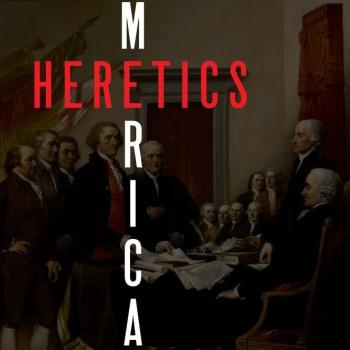Professors tend to be a grumpy lot. The pay is not exactly stratospheric. University bureaucracies can be a nuisance. My own personal gripe is that I have to pay for the privilege of parking. I would understand if I had to pay some sort of fine for because I bring such an eyesore of a vehicle onto campus, but does the administration really expect me to walk to work? See — it’s easy to grouse. As an atonement for any such grousing, here’s a round of thankfulness.
I’m thankful for my vocation. I have been extraordinarily fortunate/blessed to have obtained two long-term positions in my career thus far. The college football was better in Alabama (speaking of which, as a Notre Dame Ph.D. I’m nervously thankful for developments thus far this season); the proximity to family is much improved in northern Virginia.
Academics are blessed with many things that should promote gratitude. It’s a good job: no daily supervision, time to pursue personal intellectual interests, meaningful feedback from students (it’s not that all students love my courses, but it is extraordinarily gratifying when anyone expresses appreciation for any aspect of my teaching or mentoring), long amounts of time off (yes, there are expectations for publications and the need to prepare for new courses, but still). One main reason that there are hundreds of applicants for most academic jobs in the humanities is because it is a wonderful life.
I’m thankful for the chance to read great books, both for sheer pleasure and as part of my job. Among the best recent books I’ve read in 2012: Manning Marable’s The Autobiography of Malcolm X, S.C. Gwynne’s Empire of the Summer Moon, Laura Hillebrand’s Unbroken (the Christian conversion of Louis Zamparini at the end of this bestseller is noteworthy — not many books with such a conclusion elicit high praise from the New York Times Book Review), Erik Larson’s In the Garden of Beasts, and T.M. Luhrmann’s When God Talks Back (anyone interested in evangelicalism or spirituality more broadly should read this book).
I’m thankful to Mitt Romney. Win or lose, he managed to become the Republican nominee for president just as my biography of Brigham Young hit the shelves/warehouses. I will forever feel indebted to the former Massachusetts governor. Any chance he needs a biographer? Speaking of Brigham Young, there is nothing better than any sort of critical mass of people being interested in something one writes. I am very thankful to have discussed Brigham Young and early Mormonism with a wide variety of groups this fall.
As a member of the rapidly dwindling Presbyterian Church (U.S.A.), I am grateful for having encountered so many thriving PCUSA congregations over my post-Ph.D. geographic ramblings across the country: First Presbyterian Church Fort Collins, Springhill Presbyterian Church in Mobile, Alabama, and ?. There are several thriving and worshipful Presbyterian churches in our vicinity here. [I’m not terribly thankful for the American Protestant phenomenon of church-shopping, but at least there are good alternatives]. Mainline Protestantism may or may not be dying, but it’s not dead yet. I stick with it partly out of affection and partly out of sheer stubbornness.
I am thankful to have married someone brilliant, beautiful, loyal, and hilarious. I’m thankful she’s been willing to live in (over the past ten years) South Bend, Indiana; Portland, Maine; Fort Collins, Colorado; Mobile, Alabama; and Fairfax County, Virginia (and several summers in Utah). I am thankful for fatherhood, for a four-year-old daughter who likes wrestling with Daddy and lets me sing her hymns (current favorite is “For All the Saints”) at bedtime (admittedly while she careens wildly around her room). I am, most of all, thankful that Jesus is a friend of sinners.
Back to less weighty expressions of gratitude. I’m thankful that when it comes to holiday food, turkey rather than eel caught on.
Especially when raising the complicated and somewhat politically charged matter of the relationship between religion and the American founding, I often ask my students to read George Washington’s 1789 proclamation designating November 26 as a national day of thanksgiving. (He doesn’t mention turkey or eel). I give it to my students in part because it’s a useful starting point in a lesson designed to convince them just how difficult it is to arrive at any definitive conclusions about what “the founders” believed the relationship between religion/Christianity and the new American government should be.
This week, however, I simply reproduce part of it. Washington encouraged Americans to:
unite in most humbly offering our prayers and supplications to the great Lord and Ruler of Nations and beseech him to pardon our national and other transgressions– to enable us all, whether in public or private stations, to perform our several and relative duties properly and punctually–to render our national government a blessing to all the people, by constantly being a Government of wise, just, and constitutional laws, discreetly and faithfully executed and obeyed–to protect and guide all Sovereigns and Nations (especially such as have shewn kindness unto us) and to bless them with good government, peace, and concord–To promote the knowledge and practice of true religion and virtue, and the encrease of science among them and us–and generally to grant unto all Mankind such a degree of temporal prosperity as he alone knows to be best.
Not a bad prayer for our nation in 2012.












